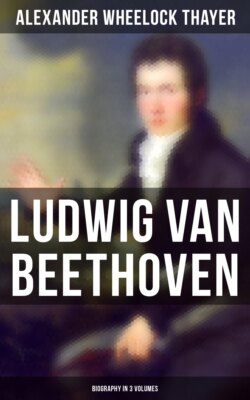Читать книгу Ludwig van Beethoven (Biography in 3 Volumes) - Alexander Wheelock Thayer - Страница 38
На сайте Литреса книга снята с продажи.
Chapter XVIII
ОглавлениеTable of Contents
Beethoven’s Brothers—His First Concert on His Own Account—Punto and the Sonata for Horn—Steibelt Confounded—E. A. Förster and the First Quartets—The Septet and First Symphony—Beethoven’s Homes—Hoffmeister—Compositions and Publications of 1800.
It is not easy to conceive upon what ground the opinion became current, as it did, that Beethoven in the year 1800 and for several years to come was still burdened with the support of his brothers—young men now respectively in their 26th and 24th years. This mistake as to Johann has already been exposed. Leaving Ludwig for the first quarter of this year doubly busy—having, in addition to his usual occupations, his preparations to make for a grand concert in April—we turn, for a page, to his brother Carl.
In the “Hof- und Staats-Schematismus” for the year 1800, at the end of the list of persons employed in the “K. K. Universal-Staatschuldenkasse” are the names of two “Praktikanten”; the first is “Mr. Carl v. Beethoven lives in the Sterngasse, 484.” In the same publication appears a new department or bureau of the above-named office called the “K. K. n. öst. Klassen-Steuer-Kasse” and the second of the three bureau officers is “Mr. Carl v. Beethoven lives unterm Tuchladen, 605.”
It is not improbable that, while simply “Praktikant,” he may have needed occasional pecuniary aid, but his preferment to the place of “Kassa-Officier” rendered him independent. This appointment is dated March 24th, 1800, and gave him a salary of 250 florins. Small as the sum now appears, it was amply sufficient, with what he could earn by teaching music (and the brother of the great Beethoven could have no lack of pupils), to enable him to live comfortably. In fact, he was better off than many a colleague in the public service, who still with care and economy managed to live respectably. It may therefore be confidently asserted that Beethoven was henceforth relieved of all care on account of Carl, as of Johann, until the bankruptcy of the government and Carl’s broken health many years later, made fraternal assistance indispensable.
At the beginning of this year Carl had tried his fortune as a composer—but probably with slender profit, since no second venture has been discovered. Six minuets, six “Deutsche” and six contradances by him are advertised in the “Wiener Zeitung” of January 11, in double editions, one for clavier and one for two violins and violoncello. The concert for which Beethoven had been preparing during the winter took place on the 2d of April. It was his first public appearance for his own benefit in Vienna, and, so far as is known, anywhere except in Prague. All that is now to be ascertained in relation to it is contained in the advertisement, in the programme, and in a single notice, sent to the “Allgemeine Musikalische Zeitung.” The programme, which was in the possession of Madame van Beethoven (widow of the composer’s nephew) is as follows:
To-day, Wednesday, April 2nd, 1800, Herr Ludwig van Beethoven will have the honor to give a grand concert for his benefit in the Royal Imperial Court Theatre beside the Burg. The pieces which will be performed are the following:
1. A grand symphony by the late Chapelmaster Mozart.
2. An aria from “The Creation” by the Princely Chapelmaster Herr Haydn, sung by Mlle. Saal.
3. A grand Concerto for the Pianoforte, played and composed by Herr Ludwig van Beethoven.
4. A Septet, most humbly and obediently dedicated to Her Majesty the Empress, and composed by Herr Ludwig van Beethoven for four stringed and three wind-instruments, played by Messrs. Schuppanzigh, Schreiber, Schindlecker, Bär, Nickel, Matauschek and Dietzel.
5. A Duet from Haydn’s “Creation,” sung by Mr. and Mlle. Saal.
6. Herr Ludwig van Beethoven will improvise on the pianoforte.
7. A new grand symphony with complete orchestra, composed by Herr Ludwig van Beethoven.
Tickets for boxes and stalls are to be had of Herr van Beethoven at his lodgings in the Tiefen Graben, No. 241, third storey, and of the box-keeper.
Prices of admission are as usual.
The beginning is at half-past 6 o’clock.
The correspondent of the “Allgemeine Musikalische Zeitung” described the concert as the most interesting affair of its kind given for a long time, said the new concerto had “many beauties, especially in the first two movements,” praised the “taste and feeling” exhibited in the Septet, and in the Symphony found “much art, novelty and wealth of ideas”; but, he continues: “unfortunately there was too much use of the wind-instruments, so that the music sounded more as if written for a military band than an orchestra.” The rest of the notice is devoted to scolding the band for inattention to the conductor. Which of the pianoforte Concertos Beethoven played on this occasion is nowhere intimated. The Symphony in C soon became known throughout Germany; while the Septet achieved a sudden popularity so widely extended and enduring as at length to become an annoyance to the composer.[91]
